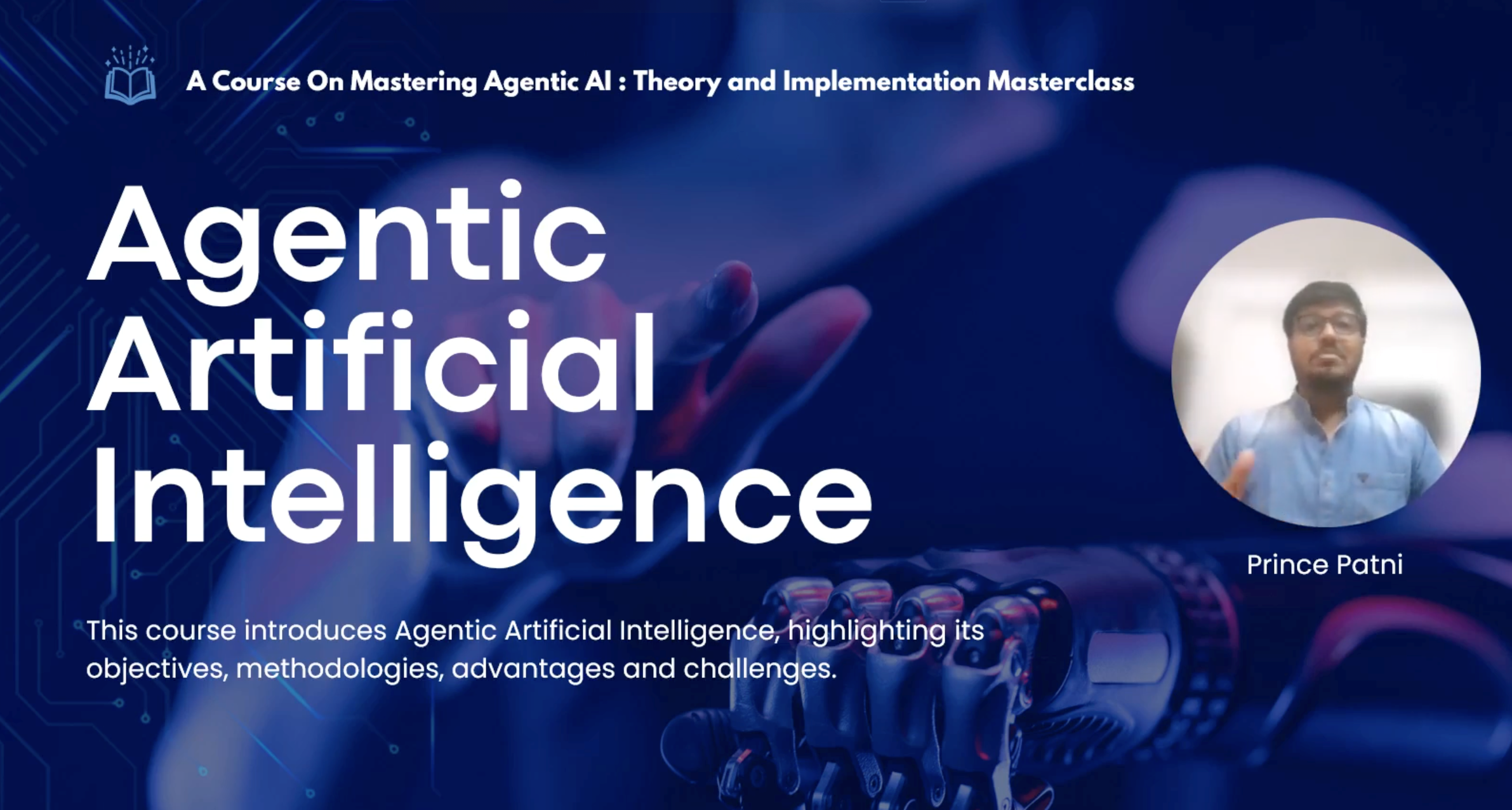Unlike traditional AI or machine learning programs, agentic AI training focuses on building systems that can reason, plan and act autonomously, blending cognitive modeling, reinforcement learning and prompt engineering with governance and safety frameworks.
Table of Contents
- Why Other AI Courses Won't Cut It
- What Makes an AI 'Agentic?' 4 Core Capabilities Explained
- The Disciplines Behind Agentic AI
- What to Look for in an Agentic AI Certification
- The 5 Best Agentic AI Courses Right Now
- FAQs on Agentic AI Certifications
Why Other AI Courses Won't Cut It
Agentic AI refers to systems that are capable of reasoning, planning and acting autonomously, a technology that is rapidly becoming the next major inflection point in artificial intelligence.
Recent research shows that 62% of organizations are at least experimenting with AI agents, and that number is set to explode in the coming months. Employees are on-board as well, with 75% of workers polled saying they're comfortable teaming up with AI agents as collaborators.
This next-gen AI is creating a new class of in-demand expertise: autonomy-aware engineers, orchestration architects, AI operations (AIOps) specialists and governance professionals who can balance innovation with control.
What Makes an AI 'Agentic?' 4 Core Capabilities Explained
While traditional generative AI systems produce outputs in response to human direction, agentic systems think and act — they interpret objectives, plan multistep actions and adapt as conditions change. Building and managing these systems requires engineers who understand how to give AI not just intelligence, but autonomy.
The core competencies are distinct. Agentic systems depend on:
- Reasoning: The ability to decompose goals into steps
- Planning: Sequencing those step
- Memory: Retaining context across long tasks
- Coordination: Working with other agents (multi-agent workflows) or APIs
The Disciplines Behind Agentic AI
Agentic AI workflows also rely heavily on governance and control mechanisms that prevent runaway automation — a skill set that combines machine learning, systems design and human factors engineering.
Developing these systems draws from an interdisciplinary foundation:
- Machine learning (ML) and Large language model (LLM) operations to train and orchestrate capable models.
- Cognitive science and behavioral modeling to anticipate how AI agents interact with goals and environments.
- Human-computer interaction (HCI) and UX design to ensure agentic systems remain transparent and aligned with user intent.
- Systems architecture and cybersecurity to secure APIs, monitor agents and control escalation paths.
What to Look for in an Agentic AI Certification
With experts predicting the agentic AI workflow market will surpass $200 billion by 2034, there's a growing need for skilled professionals who can design, deploy and govern these systems.
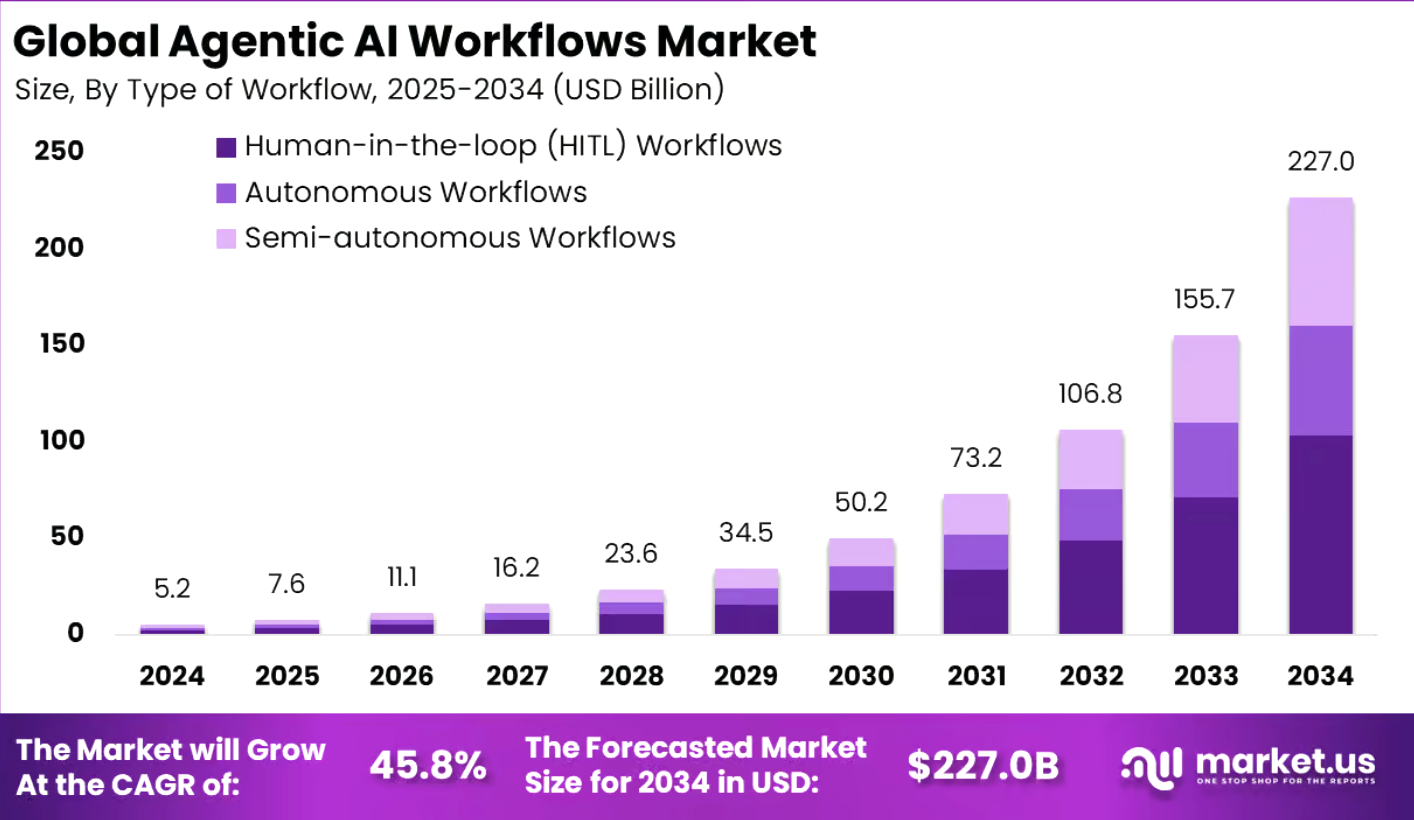
Side-by-Side Comparison: Top Agentic AI Courses & Certificates
| Course | Provider | Duration | Cost | Level |
|---|---|---|---|---|
| Certified Agentic AI Architect (LangGraph + LangChain Bootcamp) | LangChain University / Udemy | Self-paced | $16.99 standalone, or $14/mo (Udemy Personal Plan) | Intermediate (hands-on) |
| IBM RAG & Agentic Systems Professional Certificate | IBM / Coursera | ~4–6 months (typical, part-time) | ~$49/mo (Coursera subscription) | Intermediate–Advanced (enterprise focus) |
| Mastering Agentic AI: Theory & Implementation Masterclass | Udemy | ~23 hours (self-paced) | $14.99 (current promo) | Beginner–Intermediate (concepts + practice) |
| Agentic AI & Intelligent Systems Primer for Leaders | Vanderbilt University / Coursera | Self-paced (short course) | Audit free; certificate ~ $49 | Manager–Executive (non-technical) |
| Building AI Agents with LangChain & LangGraph (Intro) | DeepLearning.AI (community tutorial) | ~4 hours (self-paced) | Free | Beginner (hands-on intro) |
| Bonus: Agentic AI & AI Agents for Leaders (Specialization) | Vanderbilt University / Coursera | 3-course series (self-paced) | 7-day trial, then ~$49/mo | Executive / Strategy |
3 Rules for Choosing the Right Agentic AI Program
With multiple agentic AI courses and certifications available, how can you decide which is best for you?
1. Prioritize Hands-On Practice
Pick a program that combines hands-on implementation with conceptual depth, not just buzzword coverage. The most credible certifications typically include capstone projects or case studies in multi-agent orchestration, API integration or reasoning frameworks.
2. Look for Industry-Backed Curricula
Courses built in partnership with recognized AI ecosystems, like LangChain, OpenAI, Anthropic or IBM, tend to reflect real-world deployment practices.
3. Vet the Instructor’s Real-World Experience
Finally, evaluate the instructors themselves: seek those with active publications or direct experience building agentic systems, rather than repackaged “AI 101” content under a new label.
Related Article: AI Agents at Work: Inside Enterprise Deployments
The 5 Best Agentic AI Courses Right Now
Here are five strong programs that cover everything you need to know to succeed in the age of agentic AI.
1. Certified Agentic AI Architect (LangGraph + LangChain Bootcamp)
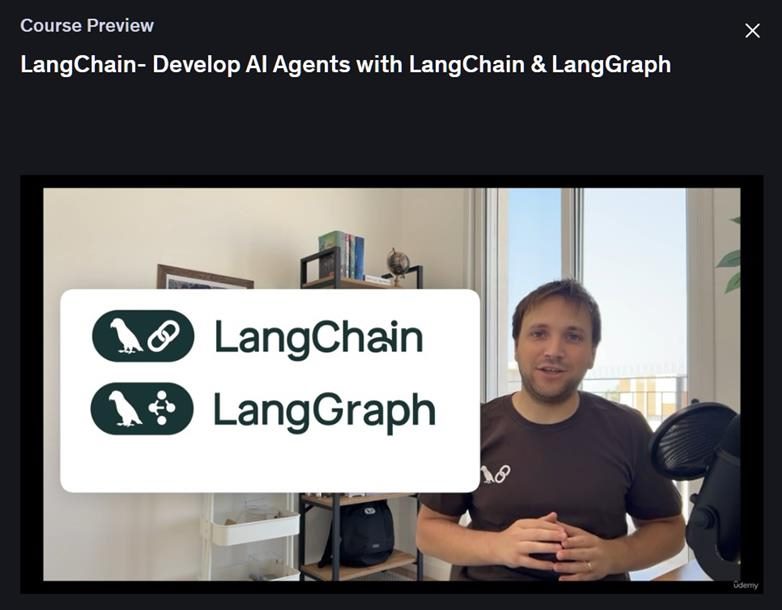
Skills Learned: Students gain hands-on experience designing, deploying and governing multi-agent systems using LangGraph and LangChain. The course teaches how to build autonomous workflows, implement reasoning and planning loops, manage agent memory and ensure safety alignment in decision-making systems.
Format & Cost: $16.99 as a standalone purchase, or $14 per month with the Personal Plan (which includes this course).
Key Modules:
- Agent architecture overview
- Memory management
- Orchestration of multi-agent systems
- Governance and safety checkpoints
Why It Stands Out: Focuses specifically on building autonomous agents and multi-agent workflows using LangGraph + LangChain, giving hands-on experience in designing reasoning and planning loops.
2. IBM RAG & Agentic Systems Professional Certificate
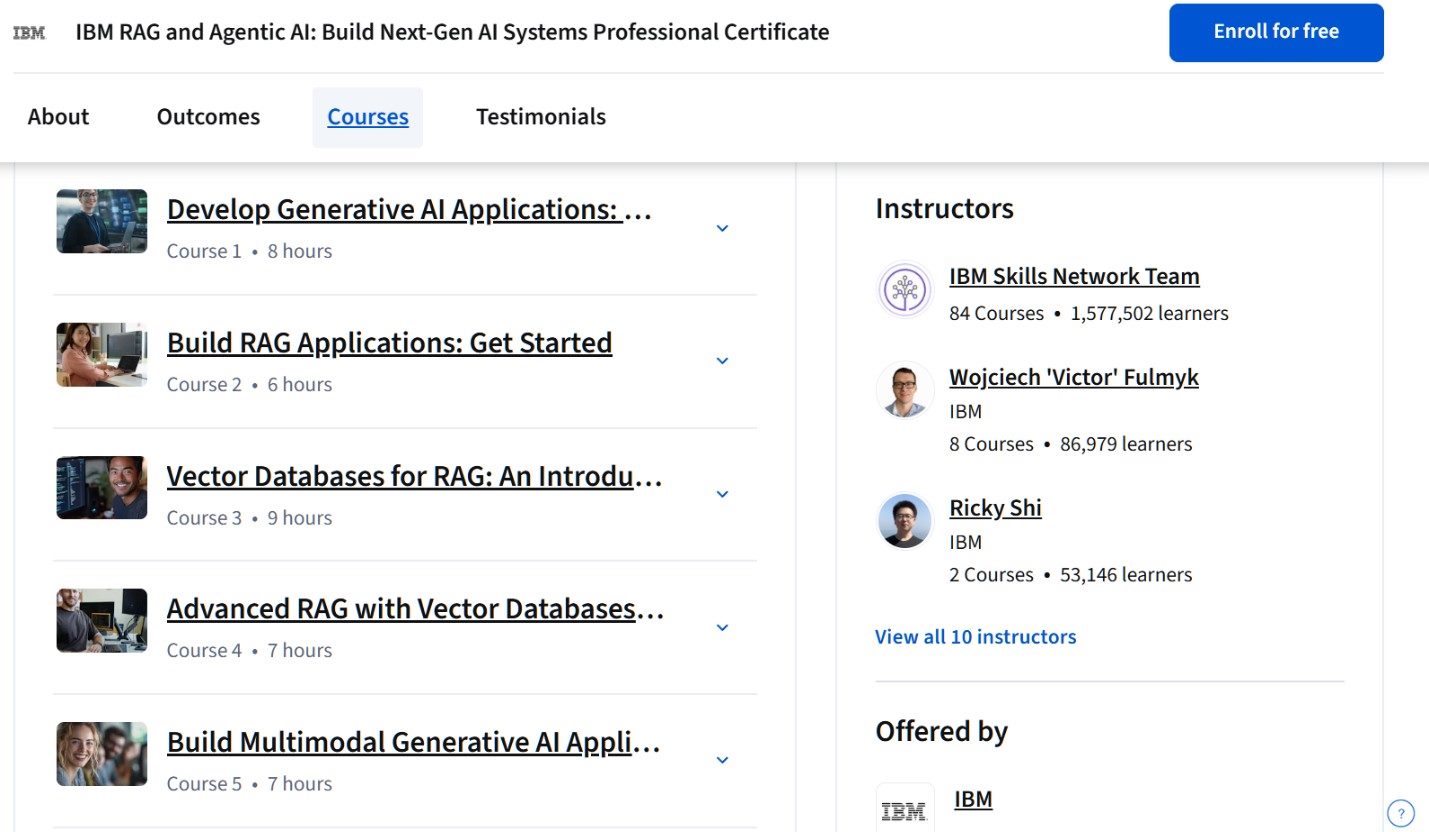
Skills Learned: This program covers the foundational and emerging techniques that power retrieval-augmented generation (RAG) and agentic AI systems. Students learn how agents plan, reason and act autonomously using structured decision loops. Core competencies include prompt orchestration, memory management, observability and governance, giving professionals the practical knowledge to design and deploy enterprise-ready intelligent agents.
Format & Cost: Subscription-based model; approximately $49 per month until completion (4–6 months typical).
Key Modules:
- Foundation models and RAG architectures
- Agent control flows
- Monitoring and observability of agents
- Safety and compliance frameworks for autonomous systems
- Human-in-the-loop oversight
Why It Stands Out: IBM’s program bridges generative and agentic AI disciplines, providing a structured foundation for professionals aiming to move from traditional ML or data roles into autonomy-aware engineering and governance positions. It combines IBM’s enterprise expertise with Coursera’s flexible format, making it accessible to both technical learners and business strategists.
3. Mastering Agentic AI : Theory and Implementation Masterclass
Skills Learned: This course teaches the fundamentals of agentic AI, covering agent types, decision-making frameworks and practical implementation approaches. It provides a comprehensive overview of how agentic AI systems operate, their core components and the human factors influencing their real-world applications.
Format & Cost: On-demand online video and course; $14.99
Key Modules:
- Agent types and architectures
- Decision-making models
- Implementation frameworks
- Real-world applications in HR and customer success
- Practical guidance for deploying agentic AI
Why It Stands Out: This course balances conceptual understanding with practical instruction, making it ideal for professionals seeking a structured introduction to the theory and implementation of agentic AI systems. Students gain a clear grasp of how reasoning, autonomy and adaptive agents are transforming industries, and how to apply these insights directly in business and technical contexts.
4: Agentic AI and AI Agents for Leaders Specialization
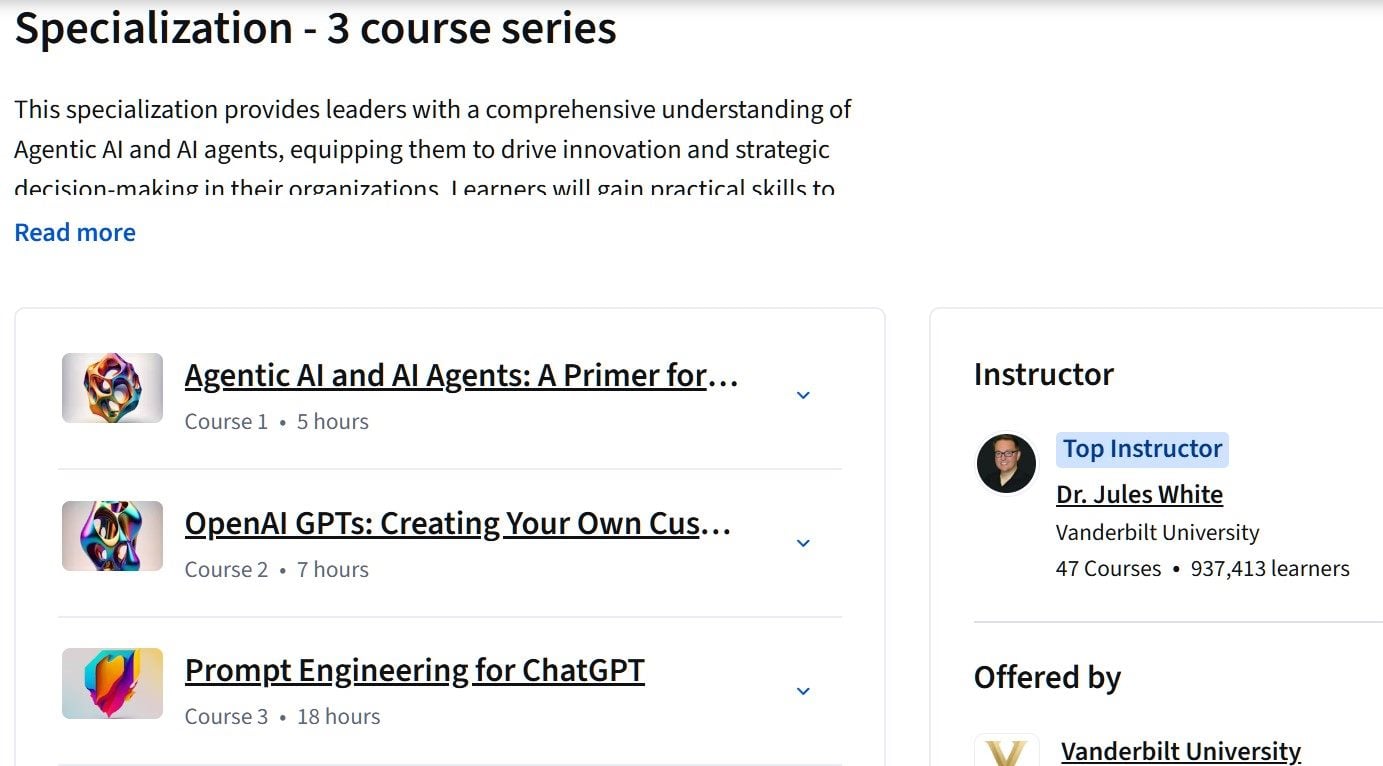
Skills Learned: Students learn to identify when and how agentic AI adds value, to evaluate agentic systems vs hype, design basic agents with custom GPTs and lead teams in autonomous-AI adoption. They also gain a strategic understanding of how to align agentic AI initiatives with business goals, ensuring responsible governance, measurable outcomes and cross-functional collaboration between business, IT and data teams.
Format & Cost: 3-course series, flexible self-paced. 7-day free trial, $49 per month after the trial ends.
Key Modules:
- Fundamentals of agentic AI
- Building custom GPT-based agents
- Leadership and oversight in agentic adoption
Why It Stands Out: Designed for business leaders rather than engineers; a natural transition from understanding generative AI to governing autonomous agents.
5. Building AI Agents with LangChain & LangGraph (Introductory Course)
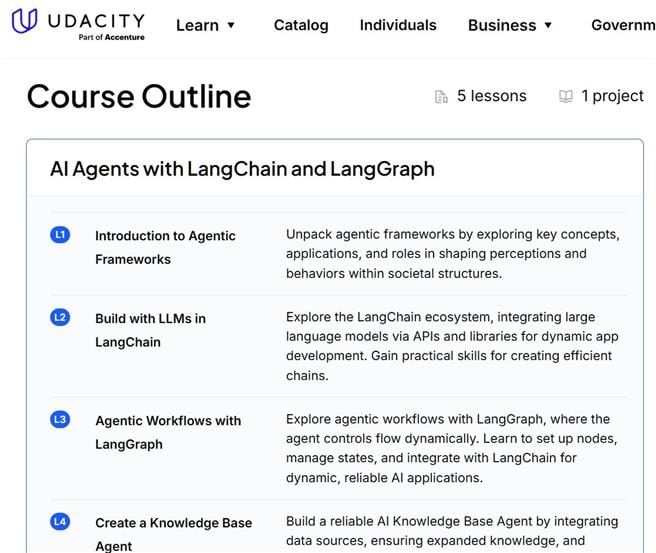
Skills Learned: Students gain practical experience building autonomous agents from scratch using LangChain and LangGraph. The course teaches foundational agent design, including planning loops, memory integration and basic AI agent orchestration across APIs, and teaches the ability to construct and test reasoning agents in real-world workflows, preparing them for more advanced agentic system architectures.
Format & Cost: 4 hours self-paced; currently $149.40 per month — includes access to over 100 additional AI courses.
Key Modules:
- Setting up LangChain
- Simple planning loop
- Agent-memory integration, testing and iteration
Why It Stands Out: Entry-level, technical-hands-on course that lets you build a simple autonomous agent using LangChain & LangGraph. Great for engineers who want to “get their hands dirty” with agentic AI.
FAQs on Agentic AI Certifications
Look for indicators like:
- Actual use of planning, memory and tool-calling
- Exercises in multi-agent orchestration
- Safety/guardrail modules
- Real-world capstone projects
- System design and error-handling workflows
If a program only covers prompt engineering, it's not truly “agentic.”
Start with:
- LangChain or LangGraph for orchestration
- OpenAI / Anthropic tool-calling APIs
- RAG basics for grounding decisions
- Python fundamentals
These provide the foundation for planning loops, memory, and multi-agent workflows.

